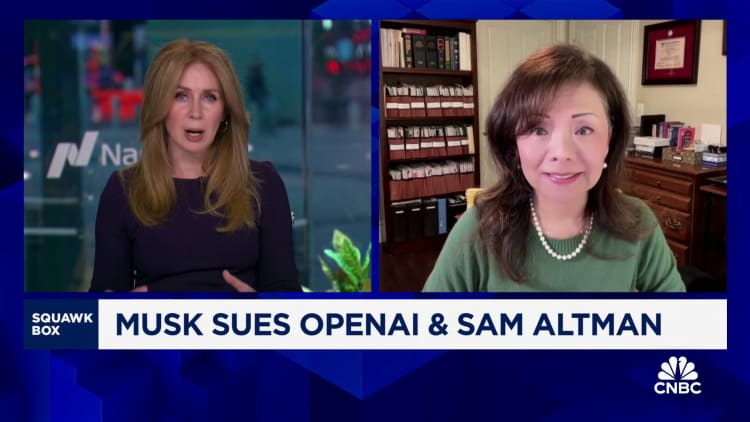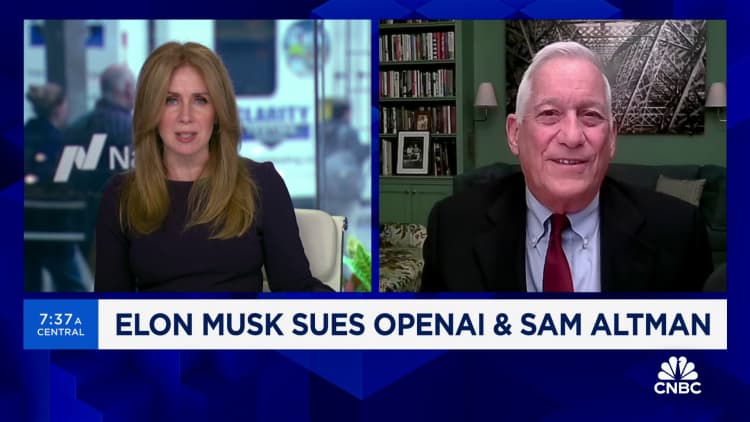Elon
Musk,
owner
of
Tesla
and
the
X
(formerly
Twitter)
platform,
attends
a
symposium
on
fighting
antisemitism
titled
‘Never
Again
:
Lip
Service
or
Deep
Conversation’
in
Krakow,
Poland
on
January
22nd,
2024.
Beata
Zawrzel
|
Nurphoto
|
Getty
Images
When
it
comes
to
legal
disputes,
Elon
Musk’s
definition
of
victory
may
not
always
be
winning
in
court.
Last
week,
Musk
sued
OpenAI
and
co-founders
Sam
Altman
and
Greg
Brockman
for
breach
of
contract
and
fiduciary
duty.
Experts
say
the
case
is
built
on
a
questionable
legal
foundation,
because
the
contract
at
the
heart
of
the
suit
isn’t
a
formal
written
agreement
that
was
signed
by
all
parties
involved.
Rather,
Musk
is
alleging
that
the
early
OpenAI
team
had
set
out
to
develop
artificial
general
intelligence,
or
AGI,
“for
the
benefit
of
humanity,”
but
that
the
project
has
been
transformed
into
a
for-profit
entity
that’s
largely
controlled
by
principal
shareholder
Microsoft.
Musk
used
much
of
the
35-page
complaint
(plus
attached
exhibits)
on
Friday
to
tell
his
side
of
the
story
and
to
remind
the
world
of
his
central
position
in
the
creation
of
a
company
that’s
since
become
one
of
the
hottest
startups
on
the
planet,
(OpenAI
ranked
first
on
CNBC’s
Disruptor
50
list
in
2023)
thanks
largely
to
the
viral
spread
of
ChatGPT.
“It’s
certainly
a
good
advertisement
for
the
benefit
of
Elon
Musk,”
Kevin
O’Brien,
partner
at
Ford
O’Brien
Landy
LLP
and
former
assistant
U.S.
attorney,
told
CNBC.
“I’m
not
sure
about
the
legal
part
though.”
O’Brien,
who
isn’t
involved
in
any
cases
with
Musk,
added,
“One
thing
that
jumped
right
out
at
me
is
there’s
no
contract.”
In
the
suit,
Musk’s
lawyers
say
they
want
OpenAI
to
return
to
its
work
as
a
research
lab
and
no
longer
exist
for
the
“financial
benefit”
of
Microsoft.
Musk,
who’s
worth
over
$200
billion,
is
unconcerned
about
the
legal
costs
of
floating
a
suit
that
has
no
clear
personal
economic
benefit
and
is
of
questionable
merit.
Shannon
Capone
Kirk,
global
head
of
e-discovery
and
AI
for
Ropes
&
Gray
LLP,
told
CNBC
that
Musk
might
just
be
seeking
to
force
more
information
into
the
public
realm
about
how
OpenAI
has
been
operating
and
how
its
business
objectives
have
morphed
in
recent
years.
Sam
Altman,
CEO
of
OpenAI,
during
an
interview
at
Bloomberg
House
on
the
opening
day
of
the
World
Economic
Forum
in
Davos,
Switzerland,
on
Jan.
16,
2024.
Chris
Ratliffe
|
Bloomberg
|
Getty
Images
It’s
a
“high-profile
case
with
great
public
interest,
a
consequence
of
which
might
lead
to
OpenAI
being
available
to
everyone,”
said
Kirk,
who
isn’t
working
on
any
cases
involving
Musk.
“Is
that
the
real
objective?”
In
their
complaint,
Musk’s
attorneys
allege
that
OpenAI
“has
been
transformed
into
a
closed-source
de
facto
subsidiary
of
the
largest
technology
company
in
the
world:
Microsoft.”
They
also
say
the
arrangement
goes
against
a
founding
agreement
and
2015
certification
of
incorporation
that
OpenAI
established
with
Musk,
who
was
a
pivotal
donor
to
OpenAI
in
its
early
years.
Musk’s
attorneys
said
their
client
contributed
over
$15
million
to
OpenAI
in
2016,
which
was
“more
than
any
other
donor”
and
helped
the
startup
build
a
team
of
“top
talent.”
The
next
year,
Musk
gave
nearly
$20
million
to
OpenAI,
which
the
attorneys
reiterated
was
more
than
other
backers.
In
total,
Musk
invested
over
$44
million
into
OpenAI
from
2016
through
September
2020,
according
to
the
suit.
The
lawsuit
fits
a
pattern
for
Musk,
who
has
frequently
posted
on
X
and
commented
in
public
forums
about
his
importance
to
the
creation
of
OpenAI.
In
November,
Musk
told
an
audience
at
the
The
New
York
Times’
DealBook
conference
that
OpenAI
had
deviated
from
its
original
mission.
“OpenAI
should
be
renamed
‘super
closed
source
for
maximum
profit
AI,’
because
this
is
what
it
actually
is,”
Musk
said
onstage
at
the
event.
He
noted
that
it’s
transformed
from
an
“open
source
foundation”
to
multibillion-dollar
“for-profit
corporation
with
closed
source.”
Is
there
injury?
In
the
suit,
Musk’s
attorneys
allege
that
the
inner
workings
of
OpenAI’s
GPT-4
AI
model
are
“a
complete
secret
except
to
OpenAI—and,
on
information
and
belief,
Microsoft,”
and
that
the
secrecy
is
driven
by
commercial
gain
rather
than
safety.
Musk
has
publicly
beefed
with
Microsoft
for
a
while,
and
in
May
2023,
Musk
attorneys
accused
the
company
of
using
X
(formerly
Twitter)
data
in
unauthorized
ways.
Even
if
OpenAI’s
mission
has
changed,
that
doesn’t
mean
Musk
has
a
solid
legal
case.
“If
he
has
any
hopes
to
recover,
he’s
going
to
have
to
prove
that
there
was
this
agreement
–
that
the
company
be
open
and
not
for
profit
and
all
these
other
things,
and
that
the
failure
to
do
so
has
caused
him
injury,
which
is
a
separate
problem,”
O’Brien
said.
“It’s
hard
to
see
where
the
injury
is
here.”
Musk’s
attorneys
didn’t
respond
to
a
request
for
comment.
Musk
has
an
AI
company
of
his
own,
X.AI,
which
introduced
a
competing
chatbot
called
Grok
in
November
after
two
months
of
training.
In
December,
X.AI
filed
with
the
SEC
to
raise
up
to
$1
billion
in
an
equity
offering.
And
Musk
is
also
developing
autonomous
vehicle
tech
and
humanoid
robotics,
which
require
AI
advances,
at
Tesla.
He’s
been
known
to
hire
bigwigs
from
OpenAI,
poaching Andrej
Karpathy,
a
former
OpenAI
software
engineer,
over
to
Tesla
in
2017.
More
recently,
Musk
hired
Kyle
Kosic
from
OpenAI
to
join
X.AI.
One
of
Musk’s
goals
with
this
case,
lawyers
said,
may
be
to
shed
light
on
details
of
OpenAI’s
GPT-4
in
the
discovery
process,
should
it
get
that
far.
O’Brien
said
it
can
be
tough
to
keep
intellectual
property
and
other
internal
details
private
when
a
lawsuit
is
brought.

watch
now
Kirk
agreed,
saying
that
in
the
discovery
stage,
there
may
be
“lots
of
document
requests
for
all
kinds
of
communication,”
such
as
internal
conversations,
text
messages
and
more.
Some
of
the
documents
produced
may
come
with
protective
orders
that
keep
them
out
of
the
public.
A
portion
of
Musk’s
lawsuit
rests
on
the
idea
that
OpenAI
has
already
reached
AGI,
typically
defined
as
AI
that
can
operate
on
the
same
level
—
or
higher
—
than
humans
when
completing
a
wide
array
of
cognitive
tasks.
The
suit
claims
that
since
GPT-4
is
“better
at
reasoning
than
average
humans”
based
on
test
scores
on
the
Uniform
Bar
Exam,
GRE
Verbal
Assessment
and
even
the
Advanced
Sommelier
exam.
As
part
of
its
contract
with
OpenAI,
Microsoft
only
has
rights
to
OpenAI’s
“pre-AGI”
technology,
and
it’s
up
to
OpenAI’s
board
to
determine
whether
the
company
has
reached
that
milestone.
In
a
memo
to
employees
on
Friday
following
the
lawsuit,
OpenAI
said
that
“GPT-4
is
not
an
AGI.”
“Importantly,
an
AGI
will
be
a
highly
autonomous
system
capable
enough
to
devise
novel
solutions
to
longstanding
challenges,”
Chief
Strategy
Officer
Jason
Kwon
wrote.
“GPT-4
can’t
do
that.”
Much
of
the
AI
community
is
in
agreement
with
Kwon.
Kirk
said
“part
of
what
they’re
going
to
be
litigating”
is
the
question
of
what
is
AGI.
Read
the
full
complaint
here:

watch
now
